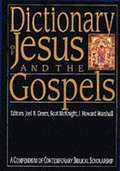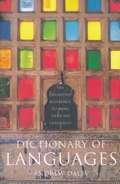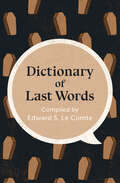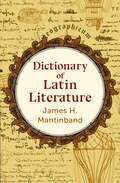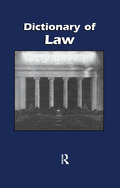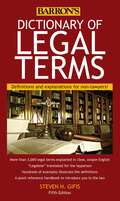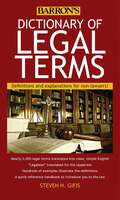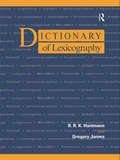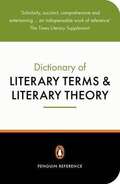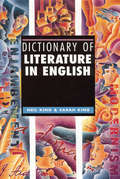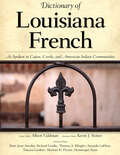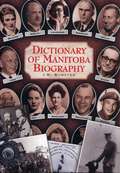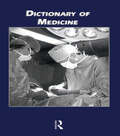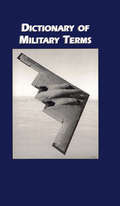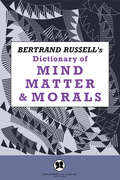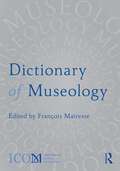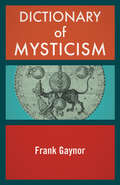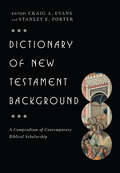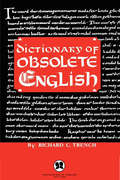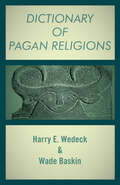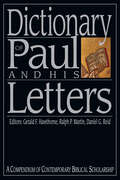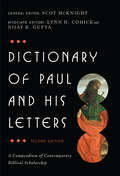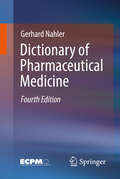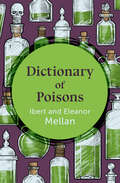- Table View
- List View
Dictionary of Jesus and the Gospels: A Compendium of Contemporary Biblical Scholarship
by Scot Mcknight Joel B. Green I. Howard MarshallRecipient of a Christianity Today1993 Critics Choice Award! Third Place Winner of Christianity Today's Book of the Year list award! The Dictionary of Jesus and the Gospels is unique among reference books on the Bible, the first volume of its kind since James Hastings published his Dictionary of Christ and the Gospels in 1909. In the more than eight decades since Hastings our understanding of Jesus, the Evangelists and their world has grown remarkably. New interpretive methods have illumined the text, the ever-changing profile of modern culture has put new questions to the Gospels, and our understanding of the Judaism of Jesus' day has advanced in ways that could not have been predicted in Hasting's day. But for many readers of the Gospels the new outlook on the Gospels remains hidden within technical journals and academic monographs. The Dictionary of Jesus and the Gospels bridges the gap between scholars and those pastors, teachers, students and lay people desiring in-depth treatment of select topics in an accessible and summary format. The topics range from cross-sectional themes (such as faith, law, Sabbath) to methods of interpretation (such as form criticism, redaction criticism, and death of Jesus) to each of the four Gospels as a whole. Some articles--such as the Dead Sea Scrolls, rabbinic traditions and revolutionary movements at the time of Jesus--provide significant background information to the Gospels.
Dictionary of Languages: The Definitive Reference to More Than 400 Languages
by Andrew DalbyApproximately how many languages compose the Bantu language group of central and southern Africa? What is the name of the language spoken in Hawaii by an estimated two thousand people? These facts and more are found in this book.
Dictionary of Last Words
by Edward S. Le ComteThis A-to-Z compendium presents the last recorded words of more than 1,500 individuals across history, from ancient kings to modern outlaws. A person&’s last words carry intrinsic and enduring fascination, especially if the individual in question is widely remembered or historically significant. Whether profound or pedestrian, these final statements can sum up an entire life—or even prophecy the future. This unique reference volume collects 1,664 quotations representing the last words of some of history&’s most famous, fascinating, and influential personalities. They include kings and queens, statesmen and scientists, poets, saints, criminals, and many others. Dictionary of Last Words is a treasure trove of deathbed pronouncements, last letters, and true gallows humor.
Dictionary of Latin Literature
by James H MantinbandDiscover the essential works of Latin literary masters with this A-to-Z reference guide spanning from ancient Rome to the Renaissance. In Dictionary of Latin Literature, classics scholar and translator James H. Mantinband provides students and curious readers with an authoritative, accessible, and wide-ranging reference book. It includes detailed entries on significant works and authors as well as important terms and concepts. Covering the history of Latin literature from the early Roman Republic to the Middle Ages and the Renaissance, this single volume offers a treasure trove of fascinating information.
Dictionary of Law
by P. H. CollinThe Dictionary of Law provides the user with a comprehensive dictionary of everyday legal terms in English. It comprises a basic vocabulary of 7,000 words and expressions used in British, American, international law--serving not just as a dictionary of law but as a dictionary, as well, of comparative law. Definitions are presented in simple English; they also include short grammatical notes, and examples are given of the words used in context.
Dictionary of Legal Terms: Definitions And Explanations For Non-lawyers
by Steven H. GifisBarron&’s Dictionary of Legal Terms includes more than 3,000 terms translated from &“legalese&” into clear, easy-to-understand language. This compact guide features: Simplified, jargon-free definitions and explanations Hundreds of relatable examples to illustrate the definitions Key forms of legislation that have shaped the legal world Whether you&’re looking for a quick legal reference or to learn more about the law, this book is ideal for consumers, business proprietors, legal beneficiaries, investors, homeowners, litigants, and anyone interested in the law.
Dictionary of Legal Terms: Definitions and Explanations for Non-Lawyers
by Stephen H. GifisUpdated to include new terms and to incorporate recent changes in laws and judicial interpretations, this handy dictionary:Contains over 2500 legal terms defined in clear, easy to understand EnglishTranslates “legalese” for the laypersonIncludes hundreds of examples to illustrate the definitionsIs an ideal book for quick reference or to learn more about the law:Non-lawyers will appreciate the way this book cuts through the complexities of legal jargon and presents definitions and explanations that are easily understood and referenced. The terms are arranged alphabetically and given with definitions and explanations for consumers, business proprietors, legal beneficiaries, investors, property owners, litigants, and all others who have dealings with the law. Find definitions on everything from Abandonment and Abatable Nuisance, all the way through to Zoning.
Dictionary of Lexicography
by R. R. Hartmann Gregory JamesDictionaries are among the most frequently consulted books, yet we know remarkably little about them. Who makes them? Where do they come from? What do they offer? How can we evaluate them?The Dictionary of Lexicography provides answers to all these questions and addresses a wide range of issues:* the traditions of dictionary-making* the different types of dictionaries and other reference works (such as thesaurus, encyclopedia, atlas and telephone directory)* the principles and concerns of lexicographers and other reference professionals* the standards of dictionary criticism and dictionary use.It is both a professional handbook and an easy-to-use reference work.This is the first time that the subject has been covered in such a comprehensive manner in the form of a reference book. All articles are self-contained, cross-referenced and uniformly structured. The whole is an up-to-date and forward-looking survey of lexicography.
Dictionary of Literary Terms and Literary Theory (4th edition)
by J. A. Cuddon C. E. PrestonDefinitions of technical terms and critical jargon, as well as explanations of literary movements, schools of literary theory, genres, and literary forms
Dictionary of Literature in English
by Sarah King Neil KingThis dictionary is a guide to the key authors, concepts, and terms used in the study of literature written in English. Each entry begins with a straightforward definition, and is followed by explanation and examples. Each writer is defined by type, significant preoccupation and/or style, and a selection of notable works. There are a number of entries on writers in a foreign language who have had a major influence on literature in English. One of the most important uses of this book is as a cross-referencing tool. Italicized cross-referenced entries form an interrelated web, presenting a unified overall picture of particular areas of interest.
Dictionary of Louisiana French: As Spoken in Cajun, Creole, and American Indian Communities
by Barry Jean Ancelet Richard Guidry Thomas A. Klingler Amanda LaFleur Tamara Lindner Michael D. Picone Dominique RyonThe Dictionary of Louisiana French (DLF) provides the richest inventory of French vocabulary in Louisiana and reflects precisely the speech of the period from 1930 to the present. This dictionary describes the current usage of French-speaking peoples in the five broad regions of South Louisiana: the coastal marshes, the banks of the Mississippi River, the central area, the north, and the western prairie. Data were collected during interviews from at least five persons in each of twenty-four areas in these regions. In addition to the data collected from fieldwork, the dictionary contains material compiled from existing lexical inventories, from texts published after 1930, and from archival recordings. The new authoritative resource, the DLF not only contains the largest number of words and expressions but also provides the most complete information available for each entry. Entries include the word in the conventional French spelling, the pronunciation (including attested variants), the part of speech classification, the English equivalent, and the word's use in common phrases. The DLF features a wealth of illustrative examples derived from fieldwork and textual sources and identification of the parish where the entry was collected or the source from which it was compiled. An English-to-Louisiana French index enables readers to find out how particular notions would be expressed in la Louisiane.
Dictionary of Manitoba Biography
by J.M. BumstedManitoba has been at the crossroads of many of the important debates and events in Canadian history. From the early fur trade to the Riel Rebellion to the Winnipeg General Strike, Manitobans have frequently played crucial roles in Canadian and sometimes world history. Until now, there has been no comprehensive, contemporary source for information on the many Manitobans who have left their mark on history and society. Dictionary of Manitoba Biography fills this gap, with biographical sketches of over 1700 Manitobans who have made an impact in politics, the arts, sports, commerce, agriculture, and society. It is an invaluable resource for scholars, students, and general readers interested in Canadian history. Particular emphasis has been placed on reflecting Manitoba's ethnic and social diversity, and on including men and women who were notable in their own day but have now been forgotten. Many entries also refer the reader to additional references for further reading. More than a reference book, Dictionary of Manitoba Biography is also a fascinating work of history in its own right, which presents the full and colourful scope of over 300 years of people in Manitoba history and social life, from premiers and mayors to nightclub owners and sports heroes.
Dictionary of Medicine
by P. H. CollinFirst Published in 1999. This dictionary provides the user with the basic vocabulary used in British and American medical practice. The subject matter covers terms used in surgery, general practice, hospitals, nursing, pharmacy, dentistry and other specializations. The level of language varies from the very technical to informal usage as between professionals or between professionals and patients. Each of the 12,000 headwords is defined in simple English, using a limited vocabulary of 500 words over and above those words which actually appear in the dictionary as main words. At the back of the book are a series of supplements which give useful information in tabular form: these refer to vitamins, incubation periods, SI equivalents, diets, and notes on eponymous words.
Dictionary of Military Terms: Over 6,000 Words Clearly Defined (Dictionaries Ser.)
by Richard BowyerFirst Published in 2000. Routledge is an imprint of Taylor & Francis, an informa company.
Dictionary of Mind Matter and Morals
by Bertrand RussellThe Dictionary of Mind, Matter, and Morals contains more than 1000 selections from over 100 of Russell's books and articles. It serves as an introduction to Russell's brilliance in analysis, argument, and exposition which develops a clear notion of his method of approach, his fundamental principles and many of his leading ideas. Here is found definitions and terms reflected in the topics of Matter, Mind, and Morals. Bertrand Arthur William Russell, 3rd Earl Russell was a British philosopher, logician, mathematician, historian, social reformer, and pacifist. Although he spent the majority of his life in England, he was born in Wales, where he also died. Russell led the British revolt against Idealism in the early 1900s and is considered one of the founders of analytic philosophy along with his protg Wittgenstein and his elder Frege. He co-authored, with A. N. Whitehead, Principia Mathematica, an attempt to ground mathematics on logic. His philosophical essay On Denoting has been considered a paradigm of philosophy. Both works have had a considerable influence on logic, mathematics, set theory, linguistics and analytic philosophy. He was a prominent anti-war activist, championing free trade between nations and anti-imperialism. Russell was imprisoned for his pacifist activism during World War I, campaigned against Adolf Hitler, for nuclear disarmament, criticised Soviet totalitarianism and the United States of America's involvement in the Vietnam War. In 1950, Russell was awarded the Nobel Prize in Literature, in recognition of his varied and significant writings in which he champions humanitarian ideals and freedom of thought.
Dictionary of Museology
by François MairesseThe internationally focused Dictionary of Museology reflects the diversity of cultural and disciplinary approaches to theory and practice in the museum field today. The museum world is changing rapidly, and the characteristics and social roles of the world’s approximately 100,000 existing museums are constantly evolving. In addition to their traditional functions of preservation, research and communication, museums are increasingly addressing issues related to social inclusion, human rights, sustainable development and finances, all of which are explored in this dictionary. Drawing on the support of an international editorial committee, including influential figures from the US, Canada, Brazil, Japan, Spain, Germany, France and the UK, this collaborative work produced by over 100 researchers from around the world provides an overview of this unique field by defining over 1,000 terms relating to museology. The Dictionary of Museology is intended for a broad spectrum of museum professionals, academics, researchers and students. The book will be especially useful to those working with international partners, since a common lexicon that conveys the complex reality of current social and cultural values is particularly vital for those working across borders.
Dictionary of Mysticism: Dictionary Of Mysticism, Encyclopedia Of Superstitions, And Dictionary Of Magic
by Frank GaynorMore than 2,200 terms defined in an essential reference on religious mysticism, esoteric philosophy, occultism, and more. Dictionary of Mysticism provides concise definitions for more than 2,200 terms used in many philosophies, religions, and doctrines which relate to the influence of the superhuman and supernatural on man&’s everyday life. Terms relating to esoteric philosophy, occultism, religious mysticism, spiritualism, alchemy, and psychical research are defined. Particular attention is given to the Eastern philosophies of Buddhism, Brahmanism, Sufism, Lamaism, Zoroastrianism, Theosophy, and Cabbalism. Also included are terms used in magic and demonology.
Dictionary of New Testament Background: A Compendium of Contemporary Biblical Scholarship (The IVP Bible Dictionary Series)
by Craig A. Evans Stanley E. PorterDictionary of New Testament BackgroundDictionary of Jesus and the Gospels, the Dictionary of Paul and His LettersDictionary of the Later New Testament and Its DevelopmentsDictionary of New Testament BackgroundDictionaryDictionary of New Testament Background
Dictionary of Newfoundland English
by W. J. Kirwin G. M. Story J.D.A. WiddowsonThe Dictionary of Newfoundland English, first published in 1982 to regional, national and international acclaim, is a historical dictionary that gives the pronunciations and definitions for words that the editors have called "Newfoundland English". The varieties of English spoken in Newfoundland date back four centuries, mainly to the early seventeenth century migratory English fishermen of Cornwall, Devon, Dorset and Somerset, and to the seventeenth to the nineteenth century immigrants chiefly from south-eastern Ireland. Culled from a vast reading of books, newspapers and magazines, this book is the most sustained reading ever undertaken of the written words of this province. The dictionary gives not only the meaning of words, but also presents each word with its variant spellings. Moreover, each definition is succeeded by an all-important quotation of usage which illustrates the typical context in which word is used. This well-researched, impressive work of scholarship illustrates how words and phrases have evolved and are used in everyday speech and writing in a specific geographical area. The Dictionary of Newfoundland English is one of the most important, comprehensive and thorough works dealing with Newfoundland. Its publication, a great addition to Newfoundlandia, Canadiana and lexicography, provides more than a regional lexicon. In fact, this entertaining and delightful book presents a panoramic view of the social, cultural and natural history, as well as the geography and economics, of the quintessential lifestyle of one of Canada's oldest European-settled areas. This second edition contains a Supplement offering approximately 1500 new or expanded entries, an increase of more than 30 per cent over the first edition. Besides new words, the Supplement includes modified and additional senses of old words and fresh derivations and usages.
Dictionary of Obsolete English
by Richard C. TrenchThis new edition of the well-known definitive glossary provides the key to those terms in the English language that have either changed their meaning or been altogether discarded . . . Words common in the days of Chaucer, Shakespeare or Johnson . . . Even words known to Dickens and Browning, but today obsolete. A fascinating handbook, not merely for the linguist and philologist, but for everyone intrigued by the colorful, the strange and the bizarre in our language.
Dictionary of Pagan Religions: Dictionary Of Satanism, Dictionary Of Witchcraft, And Dictionary Of Pagan Religions
by Wade Baskin Harry E. WedeckA comprehensive reference guide to religious cults of the ancient world, with essential information on religious systems, texts, temple sites, and more. Dictionary of Pagan Religions offers a wide-ranging survey of the many religious cults that have flourished around the world from the Stone Age to the present. From Egyptian to Celtic traditions, and Gnosticism to Cabala, coauthors Harry E. Wedeck and Wade Baskin have compiled in-depth information about the rites and rituals associated with these religious systems, as well as their surprisingly significant influence on mainstream theology and philosophy. This authoritative text includes many of the world&’s forgotten religions, with important information about their ideologies, practices, mythologies, and more. Arranged in A-to-Z format, Dictionary of Pagan Religions is an essential reference guide for any student of paganism, polytheism, or ancient religious practices.
Dictionary of Paul and His Letters: A Compendium of Contemporary Biblical Scholarship (The IVP Bible Dictionary Series)
by Gerald F. HawthorneDictionary of Paul and His LettersDictionary of Jesus and the GospelsDictionaryDictionary of Paul and His LetterssummaDictionary of Paul and His LettersDictionary of Jesus and the Gospels
Dictionary of Paul and His Letters: A Compendium of Contemporary Biblical Scholarship (The IVP Bible Dictionary Series)
by Lynn H. Cohick Scot McKnight Nijay K. GuptaThe Dictionary of Paul and His Letters is a one-of-a-kind reference work. No other resource presents as much information focused exclusively on Pauline theology, literature, background, and scholarship. This second edition is a thoroughly revised and updated version of the acclaimed 1993 publication. Since that groundbreaking volume was published, developments in Pauline studies have continued at a rapid pace, with diverse new scholars entering the conversation, new ideas and methods gaining attention, and fresh expressions of old topics shaping the present discussion. Those who enjoyed and benefited from the wealth in the first edition will find this new edition an equally indispensable and freshly up-to-date companion to study and research. Classic topics such as Christology, justification, hermeneutics, and book studies of individual epistles receive careful treatment by specialists in the field. Topics new to this edition—including Paul and politics, patronage, and interpretations from various historical and cultural perspectives—expand the volume's breadth and usefulness. Over 95% of the articles have been written specifically for this edition. This work bridges the gap between scholars and pastors, teachers and students, and all interested readers who want a thorough treatment of key topics in a summary format. In curating and compiling these articles, the editors have sought to make them comprehensive, accessible, and useful for those pursuing further research on particular subjects. Each article's bibliography, in addition, will serve a new generation of readers for years to come. The updated Dictionary of Paul and His Letters takes its place alongside the Dictionary of Jesus and the Gospels, 2nd ed., and the other volumes in the IVP Bible Dictionary Series as a unique presentation of the fruit of biblical studies—committed to Scripture, using the best of critical methods, and maintaining dialogue with both contemporary scholarship and the challenges facing the church. The reference volumes in the series provide in-depth treatment of biblical and theological topics in an accessible encyclopedia format, including cross-sectional themes, methods of interpretation, significant historical or cultural background, and each Old and New Testament book as a whole.
Dictionary of Pharmaceutical Medicine
by Gerhard NahlerIn the beginning was the word - and the foreword. Words are c- bined to sentences and eventually language. Words are listed in a dictionary and their meaning in building language are explained in a lexicon. In the life sciences - e. g. drug development sciences and pharmaceutical medicine - the analogies are evidenced by the - nomic library and patho-physiological function as the lexicon. In this transition from code to function integrated lexica pay a pivotal role for a faster understanding. The present updated version of this books combines dictionary and lexicon and provides the translational - derstanding of the complex drug development process. With a large number of new terms, their abbreviations and explanations in this complex interdisciplinary process a great number of different dis- plines and specialists need to be informed: they include physicians, pharmacists, biologists, chemists, biostatisticians, data managers, - formation specialists, business developers, marketing experts as well as regulators, financing specialists, healthcare providers and ins- ers in a continuous professional development mode. This lexicon is therefore a most suitable and economical tool for fast and conclusive information for all key-players in the development of medicines at the working place, in postgraduate training as well as during graduate education. This book is an indispensible aid in any medical library. Prof. Dr. med. Dr. h. c. Fritz R.
Dictionary of Poisons
by Ibert Mellan Eleanor MellanThis mid-twentieth-century reference guide offers a comprehensive list of poisons, with information on their origins, effects, antidotes, and more. First published in 1956, Dictionary of Poisons offers a unique look back at the timeless perils of poison. In their introduction, coauthors Ibert and Eleanor Mellan discuss the history of poison, from Biblical references to ancient Greek suicide and the historical evolution of homicidal poisoning. They then present practical information about a wide range of poisons, from household products to misused medicines and more. Arranged alphabetically, each entry includes a brief description of a given substance, along with possible causes and symptoms of, as well as first aid treatments for, poisoning.
